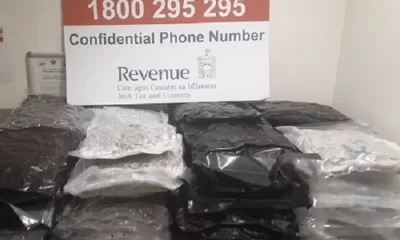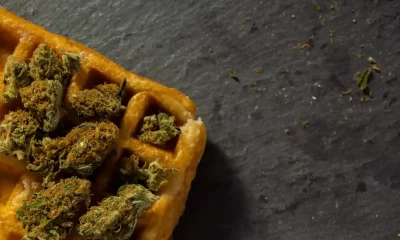Government
People Busted for Weed in the U.K. Could Lose Passports Under Proposed Rules

‘Swift, Certain, Tough’ drug conviction rules could be coming to the U.K., according a White Paper Document published by the Home Office.
Think twice about smoking a doobie while traveling in the U.K. People in England and Wales could be subject to stricter punishments, including risking losing their passports or driver’s licenses under new rules recently proposed. But some people are worried it’s a thinly-veiled attack on the middle class.
The White Paper document—titled “Swift, Certain, Tough New consequences for drug possession”—was published by the Home Office in July. People charged with drug-related crimes could risk losing their passports and driver’s licenses as the U.K. government ramps up efforts to “tackle the scourge of substance abuse in society.” The Home Office is the government department responsible for immigration, security, and law & order.
Offenders in England and Wales would be subject to a “three strikes”-style system. The system breaks up offenses into three tiers. The Telegraph reports that it’s going to impact the nation’s middle class the most—leading to bans from nightclubs over random drug convictions. And that’s just the beginning: losing a driver’s license and a passport could come next.
The three-strikes system in general is a sentencing structure designed to deter crime faster, but is decried by advocacy groups.
First, anyone caught with illegal drugs would be forced to pay for and attend a drug awareness course, and if they fail to comply, they would receive an increased fixed penalty notice or face prosecution. Second-time offenders would be cautioned, ordered to attend an additional drug awareness course, and face mandatory, random drug testing for a period of up to three months.
People charged with drugs for a third time would be likely to be charged, and upon conviction as part of a civil court order, could be subject to an exclusion order banning them from nightclubs and entertainment venues, and they could have their passports or drivers’ licenses confiscated.
The White Paper explains that drugs cause “enormous harm to children and young people, impacting on their health and their ability to work and learn,” and doesn’t make the distinction between cannabis and drugs.
Leaders agreed.
“Drug misuse puts lives at risk, fuels criminality and serious and violent crime, and also results in the grotesque exploitation of young, vulnerable people,” said Home Secretary Priti Patel. “We are cracking down on drug use with tougher consequences for so-called recreational drug users who will face the consequences of their actions through sanctions, including fines and conditions to attend rehabilitation courses, while drug offenders could have their passports and driving licenses confiscated.”
The MP continued, “In line with our strategy to tackle the harmful consequences of drugs, we aim to reverse the rising trend of substance use in society to protect the public from the harm and violence of drug misuse.”
The legislation will subsequently go through a 12-week consultation period, taking place about seven months after the government published its 10-year drug strategy.
Researchers found a 72% increase in deaths related to drug poisoning and about 2% increase in “frequent drug users” between 2011 to 2020, being defined as having taken any drug more than once in a month in the past year, according to the latest Crime Survey for England and Wales.
It’s quite the stretch of imagination for a country that commonly consumes cannabis. Private doctors who are on the General Medical Council’s specialist register can legally prescribe cannabis-based products for medicinal use.
According to polling from an industry group, the Association for the Cannabinoid Industry (ACI), one fifth of British adults have tried CBD flower or oil and 58% of respondents overall believe it has health benefits.
Even the U.K. government became a part owner in a CBD company after its emergency loan system was changed.
Business
New Mexico cannabis operator fined, loses license for alleged BioTrack fraud

New Mexico regulators fined a cannabis operator nearly $300,000 and revoked its license after the company allegedly created fake reports in the state’s traceability software.
The New Mexico Cannabis Control Division (CCD) accused marijuana manufacturer and retailer Golden Roots of 11 violations, according to Albuquerque Business First.
Golden Roots operates the The Cannabis Revolution Dispensary.
The majority of the violations are related to the Albuquerque company’s improper use of BioTrack, which has been New Mexico’s track-and-trace vendor since 2015.
The CCD alleges Golden Roots reported marijuana production only two months after it had received its vertically integrated license, according to Albuquerque Business First.
Because cannabis takes longer than two months to be cultivated, the CCD was suspicious of the report.
After inspecting the company’s premises, the CCD alleged Golden Roots reported cultivation, transportation and sales in BioTrack but wasn’t able to provide officers who inspected the site evidence that the operator was cultivating cannabis.
In April, the CCD revoked Golden Roots’ license and issued a $10,000 fine, according to the news outlet.
The company requested a hearing, which the regulator scheduled for Sept. 1.
At the hearing, the CCD testified that the company’s dried-cannabis weights in BioTrack were suspicious because they didn’t seem to accurately reflect how much weight marijuana loses as it dries.
Company employees also poorly accounted for why they were making adjustments in the system of up to 24 pounds of cannabis, making comments such as “bad” or “mistake” in the software, Albuquerque Business First reported.
Golden Roots was fined $298,972.05 – the amount regulators allege the company made selling products that weren’t properly accounted for in BioTrack.
The CCD has been cracking down on cannabis operators accused of selling products procured from out-of-state or not grown legally:
- Regulators alleged in August that Albuquerque dispensary Sawmill Sweet Leaf sold out-of-state products and didn’t have a license for extraction.
- Paradise Exotics Distro lost its license in July after regulators alleged the company sold products made in California.
Golden Roots was the first alleged rulebreaker in New Mexico to be asked to pay a large fine.
Source: https://mjbizdaily.com/new-mexico-cannabis-operator-fined-loses-license-for-alleged-biotrack-fraud/
Business
Marijuana companies suing US attorney general in federal prohibition challenge

Four marijuana companies, including a multistate operator, have filed a lawsuit against U.S. Attorney General Merrick Garland in which they allege the federal MJ prohibition under the Controlled Substances Act is no longer constitutional.
According to the complaint, filed Thursday in U.S. District Court in Massachusetts, retailer Canna Provisions, Treevit delivery service CEO Gyasi Sellers, cultivator Wiseacre Farm and MSO Verano Holdings Corp. are all harmed by “the federal government’s unconstitutional ban on cultivating, manufacturing, distributing, or possessing intrastate marijuana.”
Verano is headquartered in Chicago but has operations in Massachusetts; the other three operators are based in Massachusetts.
The lawsuit seeks a ruling that the “Controlled Substances Act is unconstitutional as applied to the intrastate cultivation, manufacture, possession, and distribution of marijuana pursuant to state law.”
The companies want the case to go before the U.S. Supreme Court.
They hired prominent law firm Boies Schiller Flexner to represent them.
The New York-based firm’s principal is David Boies, whose former clients include Microsoft, former presidential candidate Al Gore and Elizabeth Holmes’ disgraced startup Theranos.
Similar challenges to the federal Controlled Substances Act (CSA) have failed.
One such challenge led to a landmark Supreme Court decision in 2005.
In Gonzalez vs. Raich, the highest court in the United States ruled in a 6-3 decision that the commerce clause of the U.S. Constitution gave Congress the power to outlaw marijuana federally, even though state laws allow the cultivation and sale of cannabis.
In the 18 years since that ruling, 23 states and the District of Columbia have legalized adult-use marijuana and the federal government has allowed a multibillion-dollar cannabis industry to thrive.
Since both Congress and the U.S. Department of Justice, currently headed by Garland, have declined to intervene in state-licensed marijuana markets, the key facts that led to the Supreme Court’s 2005 ruling “no longer apply,” Boies said in a statement Thursday.
“The Supreme Court has since made clear that the federal government lacks the authority to regulate purely intrastate commerce,” Boies said.
“Moreover, the facts on which those precedents are based are no longer true.”
Verano President Darren Weiss said in a statement the company is “prepared to bring this case all the way to the Supreme Court in order to align federal law with how Congress has acted for years.”
While the Biden administration’s push to reschedule marijuana would help solve marijuana operators’ federal tax woes, neither rescheduling nor modest Congressional reforms such as the SAFER Banking Act “solve the fundamental issue,” Weiss added.
“The application of the CSA to lawful state-run cannabis business is an unconstitutional overreach on state sovereignty that has led to decades of harm, failed businesses, lost jobs, and unsafe working conditions.”
Business
Alabama to make another attempt Dec. 1 to award medical cannabis licenses

Alabama regulators are targeting Dec. 1 to award the first batch of medical cannabis business licenses after the agency’s first two attempts were scrapped because of scoring errors and litigation.
The first licenses will be awarded to individual cultivators, delivery providers, processors, dispensaries and state testing labs, according to the Alabama Medical Cannabis Commission (AMCC).
Then, on Dec. 12, the AMCC will award licenses for vertically integrated operations, a designation set primarily for multistate operators.
Licenses are expected to be handed out 28 days after they have been awarded, so MMJ production could begin in early January, according to the Alabama Daily News.
That means MMJ products could be available for patients around early March, an AMCC spokesperson told the media outlet.
Regulators initially awarded 21 business licenses in June, only to void them after applicants alleged inconsistencies with how the applications were scored.
Then, in August, the state awarded 24 different licenses – 19 went to June recipients – only to reverse themselves again and scratch those licenses after spurned applicants filed lawsuits.
A state judge dismissed a lawsuit filed by Chicago-based MSO Verano Holdings Corp., but another lawsuit is pending.
Source: https://mjbizdaily.com/alabama-plans-to-award-medical-cannabis-licenses-dec-1/
-

 Business2 years ago
Business2 years agoPot Odor Does Not Justify Probable Cause for Vehicle Searches, Minnesota Court Affirms
-

 Business2 years ago
Business2 years agoNew Mexico cannabis operator fined, loses license for alleged BioTrack fraud
-

 Business2 years ago
Business2 years agoAlabama to make another attempt Dec. 1 to award medical cannabis licenses
-

 Business2 years ago
Business2 years agoWashington State Pays Out $9.4 Million in Refunds Relating to Drug Convictions
-

 Business2 years ago
Business2 years agoMarijuana companies suing US attorney general in federal prohibition challenge
-

 Business2 years ago
Business2 years agoLegal Marijuana Handed A Nothing Burger From NY State
-

 Business2 years ago
Business2 years agoCan Cannabis Help Seasonal Depression
-

 Blogs2 years ago
Blogs2 years agoCannabis Art Is Flourishing On Etsy













